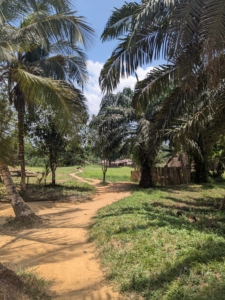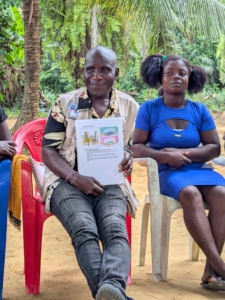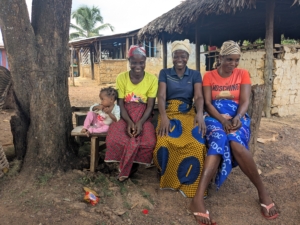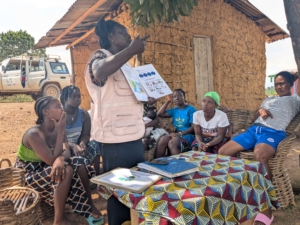Under the shade of leafy trees in Yarpah Town, Liberia, a dozen women sit on wooden benches and plastic chairs. One nurses an infant, while another keeps an eye on her toddler as she plays nearby. “What is the most important thing you remember from our last meeting?” asks the only man among them: Junior Gpalay, a community health worker who has provided care for patients in the small community for a decade.
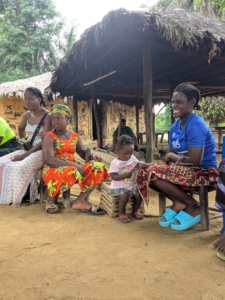
Members of the Yarpah Town mother-to-mother support group listen to another member share her thoughts.
“I know that when it’s time for me to have my baby, I will go to the hospital, and it will be safe for me,” offers a young woman named Mary Vincent. “After I have my baby, I can use family planning so I can wait until my baby is older before I get pregnant again. I want to wait until this baby is older and I am ready.”
“You should go and see a health worker when you first know you are pregnant,” adds Mamie Yarkpeh, an older member of the group whose children have reached their teenage years. “If you don’t go soon, there can be problems. Don’t wait until you are eight months, nine months. You could have a problem, and have the child at home or on the road. Go to the clinic quick-quick and it will be good.”
This is a meeting of a mother-to-mother peer support group, a new program launched by Liberia’s Ministry of Health’s Community Health Department and the Ministry’s leading technical partner, Last Mile Health. Developed to address Liberia’s high rates of maternal and child mortality—identified as an urgent health priority by the government of Liberia—the groups bring women together to learn how they can make healthy choices for themselves and their children. The program utilizes the country’s strong foundation of community-based primary care: the National Community Health Program, which trains and deploys paid, professional community health workers to deliver care to their neighbors in rural and remote communities across Liberia. The peer support groups launched in 2024 in Rivercess County, where the Ministry and Last Mile Health test new interventions in community health before refining them for national scaling. As of September 2025, 58 groups meet regularly across the county, facilitated by community health workers. So far, more than 500 women have attended at least one group meeting—and as word spreads from mother to mother, that number continues to grow.
Leveraging community health workers to lead new maternal health interventions
“Liberia has some of the highest maternal mortality and under-five mortality rates in the world. Nutrition problems for under-five children, low health-seeking behavior, and community deliveries are still happening frequently,” explains Dr. Lekilay G. Tehmeh, Last Mile Health’s Senior Director, Service Delivery. “Across our partnership with the Ministry of Health, we’ve seen the power of community-led work, especially through community health workers in the National Community Health Program. In terms of ownership and sustainability, community-facing work is the way to go.”
Based on strong results from peer support groups in other countries with similar contexts, Last Mile Health recommended developing a program tailored to Liberia’s needs, leveraging the proven reach of community health workers and addressing specific opportunities to drive maternal and child health gains, with an emphasis on increasing health-seeking behavior and facility referrals. Training for community health workers (as well as supervisors and county-level Ministry of Health staff) equipped them to organize and run the groups, integrating them into the regular operations of the National Community Health Program. To make a lasting impact—scalable at the national level—the groups would need to be manageable without major overhead costs for the Ministry or workload for community health workers. They would also need to meet the needs of women in rural and remote communities: offering the support they most needed while working around the demands of small family-run farms scattered across miles of challenging terrain, where travel by foot for hours is often the only way to reach a health facility. With this in mind, Last Mile Health designed the groups with long-term sustainability and community ownership as priorities from the start. This meant building buy-in from national-level Ministry staff—and listening and responding to the needs of community health workers and community members.
“Communities taking the lead and providing their own solution: we see a lot of power in that,” says Savior Flomo Mendin, Last Mile Health’s Project Manager, Clinical Innovations. “If you’re part of the solution and you take ownership of it, you’ll want to make sure it’s successful. We’ve seen a lot since the establishment of these groups—people creating a way that they can share with each other, work together. We can see that it’s helping create sustainable practices.”
Engaging community members and local leaders to build trust, engagement, and ownership
Community health workers facilitate the groups following an established curriculum that covers one topic in maternal and child health each week (such as reproductive health, immunizations, or nutrition). But participants shape the discussion, raising questions, offering perspectives from their lived experiences, and creating solutions to challenges they face. In one group, Savior notes, women struggled to afford the cost of emergency transport to health facilities when faced with pregnancy complications or premature delivery. Together, the group decided to create an emergency transport fund, with each member contributing a small amount of money toward the fund at each meeting.
The program engages community leaders in spreading awareness and leans on trained traditional midwives—trusted women in the community who have received formal training to accompany their existing skills as traditional birth attendants—to help break down women’s hesitations about seeking care from the formal health system. Working alongside midwives helps build women’s willingness to discuss sensitive topics with community health workers, most of whom are men (despite some recent progress toward achieving greater gender equity in the community health workforce, a goal the Ministry of Health is working to reach with Last Mile Health’s partnership). Ultimately, community members themselves will receive support from community health workers and supervisors to lead their own groups at different times of day or in different locations, helping ensure more women can attend if their work, childcare, or distance keeps them from attending the sessions led by community health workers.
Measuring impact to maximize health outcomes
Launched in early 2025, the groups have set regular meeting times and established strong and growing attendance—no small feat in communities where women must balance the changing seasonal demands of farming with raising their children. Meanwhile, Last Mile Health has worked alongside the Ministry of Health to develop and implement monitoring plans: community health workers are equipped with checklists to track attendance and referrals at each meeting for regular review. We’ve also established supervision to support community health workers as they facilitate meetings. Community health supervisors as well as other county-level Ministry and Last Mile Health staff attend meetings periodically to ensure content is being covered effectively, and supervisors provide coaching to help community health workers continuously build their skills and independence as facilitators. Additional checklists for supervision and management allow Last Mile Health and the county health team to track key metrics, and digital versions of the checklists are being rolled out to make supervision and data collection seamless and easily shareable.
By collecting and analyzing data on meeting quality, attendance, referrals, and health outcomes, we’ll be able to understand the groups’ impact on health-seeking behaviors and maternal and child health. From there, we’ll target opportunities to increase that impact while working alongside communities to shape and sustain the groups in the long-term, taking ownership to ensure they meet their communities’ unique needs.
Looking ahead: Government ownership, community leadership, individual impact
National scaling, owned and led by the Ministry of Health with input from community health workers and communities, is the long-term goal for the program. By the third year of the pilot, we aim to develop and implement a transition strategy for the support groups to continue without Last Mile Health’s oversight, with the community and community health workers owning and leading groups sustainably and functionally. We’ll work to ensure the Ministry of Health remains in the driver’s seat as the groups mature and transition to community ownership—and that the Ministry is prepared to lead and own national scaling of the program following the pilot model. We’ll continue to collect data and track metrics to understand and maximize the groups’ impact. At the community and national level, the program has the potential to reduce maternal and child mortality rates while driving improvements in additional health outcomes such as childhood immunizations, skilled treatment of major childhood illnesses, and child nutrition.
Reaching these larger-scale goals will take time. Already, though, the immediate impact of the groups is visible at the individual level. In Yarpah Town, group member Mamie Yarkpeh says, “I want to make life choices that support my children to have a good life. What we talk about here helps me do that. My children are older now, and they are in high school in Monrovia, but I can talk to my daughters and help them learn what I’m learning in the group.”
Sharing ideas and support from mother to mother has already begun in the communities where peer groups are meeting. Community health workers note the growing engagement and ownership by women in their groups—and they’re encouraged by the initiative women are taking in spreading the word and developing solutions that work for them.
“How can we benefit from mother to mother?” asks Musu Johnson, a community health worker who leads a support group in Nimba Junction. “Our health depends on us, our own selves. We can learn what to do, what not to do. We can decide what we want.”

